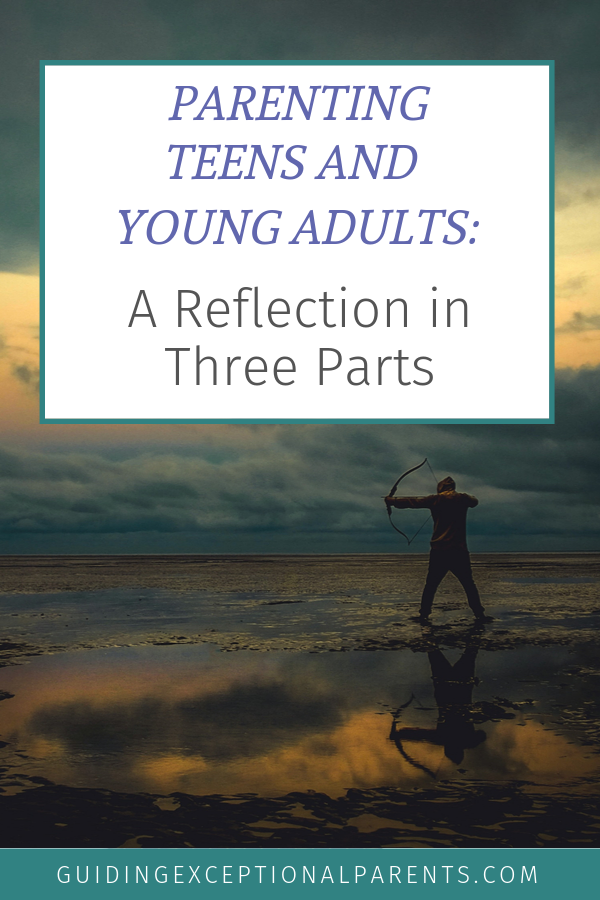You know how sometimes you feel like the universe is trying to send you a message? I’ve been getting that feeling over the last few months. With my own children navigating the treacherous transition to adulthood I have been reflecting on my role in their journey, and the role I have had in getting them to where they are now.
Did I do too much? Too little? Are my sons’ struggles to be expected? Were they avoidable? And of course, I’ve been wondering how the lessons I’m learning can help me to guide other parents.
Part 1: The Parents’ Role in a Child’s Journey
The Scene: April 2019, the 2019 Diamonds in the Rough – Parenting Children with Special Needs: Preparing to Launch at Every Age conference, hosted by the Weinfeld Education Group. The program addresses issues that face parents, professionals, and teachers – anyone supporting a child with disabilities.
The last panel of the day is five students in their 20s, each of whom has overcome significant challenges on their path to adulthood. As they describe their journeys, I am struck by their courage. I am also struck by the incredible support they must have gotten from their parents – who persevered even when they must have been terrified over whether their children would be able to get through some very dark times – providing patience, opportunities, incredible love, and faith in their children.
At the end of the panel discussion, the moderator opens the discussion to the audience for questions. I raise my hand. “What did your parents do that was helpful?”
Silence.
The panelists struggle to answer the question, even though I am pretty sure that their parents made countless sacrifices, opened doors, helped when needed, and provided their kids with opportunities that would ultimately lead to their successful launch to adult life.
I am stunned. And reflecting on my own children, I can see that this is the normal state of affairs. My children know that I would do anything for them, but they are blissfully unaware of exactly what I have done. It’s not appropriate that they know about painful school meetings that left me drained and depressed. They shouldn’t be aware of the countless hours I spent researching options and talking to others to figure out how to best help them. And I can never tell them about how I had to unlearn everything I thought I knew about parenting, forging a new path based on new information, customized to the children I had. As parents, we embrace the challenge of guiding our children, even as they do not know they are receiving something with value beyond measure.
Part 2: The Bow that Sends the Arrow
When describing the above scene to a client, he mentioned a poem that had helped him navigate parenting for many years.
On Children
by Khalil Gibran in The Prophet
Your children are not your children.
They are the sons and daughters of Life’s longing for itself.
They come through you but not from you,
And though they are with you yet they belong not to you.
You may give them your love but not your thoughts,
For they have their own thoughts.
You may house their bodies but not their souls,
For their souls dwell in the house of tomorrow,
which you cannot visit, not even in your dreams.
You may strive to be like them,
but seek not to make them like you,
for life goes not backward nor tarries with yesterday.
You are the bows from which your children
as living arrows are sent forth.
The archer sees the mark upon the path of the infinite,
and he bends you with His might
that his arrows may go swift and far.
Let your bending in the archer’s hand be for gladness;
For even as he loves the arrow that flies,
so he loves also the bow that is stable.
Have I been stable? Have I bent to the degree necessary to help my children? How hard has the archer pulled? How much should I bend? Where are my children heading?
Part 3: Is It Okay to Clear a Path?
A week or so later in my perennial quest to be a better mom, I stumbled across a beautifully written article: Resilience is Great. But Sometimes It’s Okay for Parents to Clear a Path for Their Kids. In it, the author, Louise Gleeson, reflects:
“Raising young adults has brought a constant hum of uncertainty about when to intervene and when to let the space between us widen…. We have to do a better job of stepping off the path our children travel to adulthood, we are told. And I listen, but it doesn’t mean I always heed that advice.”
When to back off, when to push, and when to be a safe landing place. As a parent, I struggle with this balance every single day. I’ve even written about it! As a parent of children with exceptionalities, the struggle is especially challenging. I must send them forth, but I must also do what I can to help them reach their full potential.
When our children are young, we are told about the importance of being involved. We are judged by the level of support we provide. And, eventually, as we work to make sure our children can access every opportunity, our children find their path. As they mature, we are pushed to the sidelines and told to stop interfering. Stop being a helicopter. Stop bulldozing a path. Let them find their own way.
There are times when we must help. We must provide the support our children need or we risk losing them. Helping our kids with disabilities is part of what parents do when teachers, camp counselors, clinicians, and other community members give up on them. This means that we can’t let the path widen in the same way or at the same time as other parents might. But in the end, we must do so, or our children won’t be able to find their way to the infinite. Louise Gleeson reflects:
“I wasn’t trying to smooth the path ahead of her; only time and courage can do that. But I did want all the moments of resilience I’ve collected in my own life to be like a wind at her back, nudging her forward to a new horizon. I wanted her to run ahead knowing I was behind her, and I would be there no matter how long it took or how much my body ached from the effort.”
Like all of us, she wants to be the stable bow that bends and releases so her child can aim for the infinite. And her daughter will never know how much she has had to bend.
—
As I pondered these messages, I better understood a shift I have been feeling as my children mature. I am desperate to stop helicoptering and bulldozing. I want them to find their way, to fly into their future. I am ready to step aside. To be honest, I’m also tired. The metaphor of the bird kicking their fledgling out of the nest feels very real to me now – and also biologically imperative. It’s not just for the good of the offspring – it’s also important for me and my husband to move on to the next phase of our own lives.
But are they ready? Am I? Is any parent ever ready? The stakes feel so high when you have a child with differences. And, like all parents, all we can do is work to be the stable and bending bow. While I must do everything I can to get the necessary supports in place, in the end, it’s up to my boys to navigate their future. The sooner I can let go and accept that, the better.
Image by Zoltan Tasi via Unsplash
Do you need help with your child? Sarah Wayland can help you figure out how to support your child via classes, Special Needs Care Navigation services, Parent Coaching, or as your certified Relationship Development Intervention (RDI) consultant.
Share this post on Pinterest!


Your reflective wisdom is remarkable, Sarah. One of the hardest parts of parenting neuro-atypical kids is sometimes overriding the powerful desperation to help our kids, so they can learn to help themselves.
Sarah, your thought and comments are applicable to us now. We have a 26 year old who has launched himself into independence, and a 24 year old who is not yet ready to launch. We are walking the tightrope of how much to push and how much to give support. It’s a fine high wire act. Thank you for being a support to all of us parents. 🙂